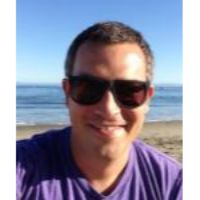
Writer's Bio:
Aaron joined the Texas Advanced Computing Center (TACC) at The University of Texas at Austin in October 2007 as the Science and Technology Writer with the responsibility of reporting on the myriad of computational research and R&D projects undertaken by the open science community and TACC staff. Writing weekly articles for TACC, NSF and industry publications and websites, Aaron strives to communicate the scientific and social significance of each discovery, while capturing the passion, creativity and know-how of researchers and advanced computing users.

I attended KITP as a Journalist in Residence in June/July 2013 during the programs, “Exploring TeV Scale New Physics with LHC Data” and “A Universe of Black Holes”. During my four weeks at the Institute, I conducted in depth interviews with six visiting and long term participants at KITP and sat in on dozens of talks, both as part of the LHC conference and in the smaller, daily group meetings of the Black Hole program.
Though many of the talks were esoteric and beyond my grasp, the presentations and the back and forth discussion afterward helped me understand the current state of knowledge in the particle physics and astrophysics communities. They also gave me a better sense of how new ideas and theories are developed and hashed out among scientists at institutes like this one. Ideas that were emerging, proposed, or fully theoretical — beyond the capacity of current technologies — were discussed, debated and honed in the collegial atmosphere of KITP.
Very quickly I realized that my knowledge was lacking in basic aspects of quantum mechanics and relativistic physics. This inspired me to do some in depth reading to better grasp the underlying framework upon which the new ideas I was hearing about were based. As a reporter who constantly writes about diverse aspects of science, engineering and technology research (often covering a new subfield each week), I appreciated the opportunity to focus more in depth on basic science. This time of study and engagement will allow me to provide more depth of understanding to the projects that I began at KITP, as well as those I’ll write in the future.
The bulk of my interviews were with younger program participants – especially those who use advanced computing, simulation and modeling in their work, as that was my focus. However, the interviews I enjoyed most were with two emeritus scholars affiliated with the Institute: Robert Sugar, one of the founders of KITP; and Jean Pierre Hebert, KITP’s Artist in Residence. It’s easy to get caught up in the day to day advances of science and technology and to only write about the latest finding or invention. However, meeting with these individuals, each of whom had been working in their area for more than 40 years, reminded me of the long term nature of science and the wisdom that such an effort can impart.
Another of the scientists I interviewed, Pran Nath, considered one of the fathers of supergravity, had waited 30 years for his predictions of the mass of the Higgs Boson to be confirmed or repudiated. Speaking with him (months after the confirmation of his prediction), I gained an appreciation for the degree to which theorists go out on a limb, proposing explanations for the physical world that stretch beyond observation, intuition, or provability, at least in the short term. Also apparent were the ways that new observations constrain some ideas, discredit others, and suggest new areas of inquiry.
Personally, my time at KITP opened up questions about how much a generalist science journalist can know about a given subject, vis à vis those who have studied a topic for decades and practice/learn everyday. This led me to question how I go about writing articles and what I’m trying to inform my readers about and what I hope to learn myself during the process. I asked this question of many of the other participants: How to bring the public to a place of appreciation and understanding for the work that theoretical physicists do in today’s world? Their answer surprised me: worry less about the specifics and focus on the basics of logic and the scientific process. I’m trying to take this lesson to heart.
In addition to the specific research I learned about at KITP, I grew interested in the abstract, poetic and philosophic potential of contemporary scientific concepts. Particle physics and black holes are full of beautiful imagery and ideas, with a rich vocabulary of concepts and processes; they also touch on the origins and essential nature of the universe. I ended up writing a series of poems that expressed my experiences during my time among the theoretical physicists. I hope to continue to integrate scientific and poetic ideas in this body of work.
In the month I spent at KITP, I developed casual, collegial relationships with dozens of researchers who I can contact to provide a frame of reference and/or statements for articles in their fields, and to help develop leads for future articles. And giving a presentation to the scientists at the Institute forced me to step back, assess and articulate my position in the science knowledge ecosystem; to take a hard look at the impact of my efforts; and to express my strategic view of how scientists can and should work with journalists and public information officers like me.